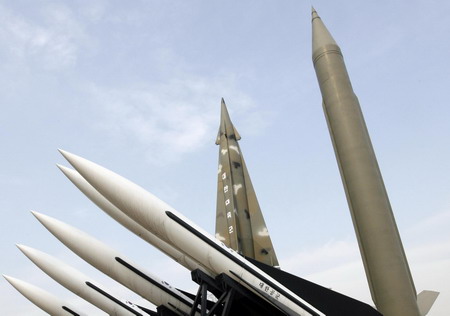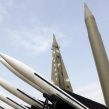
Beijing Mulling Tougher Tactics Against Pyongyang
Publication: China Brief Volume: 9 Issue: 12

Beijing’s reaction to the recent North Korean nuclear test may not seem significantly harsher than its response to the DPRK’s October 2006 detonation of a similar device. The Chinese Communist Party (CCP) administration is still calling on concerned countries to conduct “negotiations and dialogue” with the Kim Jong Il government to settle the issue. Yet there is evidence galore that the Chinese leadership under President Hu Jintao is considering tougher tactics against Pyongyang due to new perceptions within China that the DPRK is intent upon becoming a “nuclear state”—not merely playing poker with the United States or South Korea so as to extract concessions such as economic or energy aid—and that a nuclearized DRPK could threaten China as much as it does South Korea, Japan or the United States.
Immediately after the May 25 nuclear test, Beijing’s Ministry of Foreign Affairs (MOFA) expressed the Chinese government’s “resolute opposition,” adding that Pyongyang had failed to heed the “international community’s general opposition” to nuclearization of the Korean Peninsula. Yet, the MOFA also called upon all parties to use “cool-headed and appropriate means” such as “consultation and dialogue” with the DPRK so as to to resolve the question in a peaceful manner. Moreover, Beijing did not employ the highly charged word hanran, or “brazen,” that it had used in October 2006 to condemn Pyongyang’s first nuclear test after the start of the Six Party Talks. In a statement on June 2, MOFA spokesman Qin Gang further appealled to relevant countries to “remain calm and restrained, and not to take actions that will further escalate the situation” (Foreign Ministry Spokesman, June 2).
Yet it is evident that the Hu leadership is undertaking a thorough revaluation of China’s relationship with its “ally.” This sea-change in Chinese opinion has apparently been brought about by Beijing’s realization that Pyongyang is really serious about building a full-fledged nuclear arsenal. Beijing’s harsher stance on the Kim dynasty has been expressed by one of China’s foremost North Korean experts, Zhang Liangui, a Central Party School (CPS) professor who advises the leadership on Korean issues. In interviews that Zhang has given to foreign as well as domestic media such as CCTV, China Daily and the Global Times newspaper, the Korea specialist said Beijing knew that the Kim regime was genuinely committed to “turning the DPRK into a truly nuclear state”—and is not just playing games with the United States, Japan or South Korea. “The DPRK was not simply bluffing; it has actually been developing nuclear weapons,” Zhang said. He added that producing nuclear-tipped long-range missiles was “part of the current leadership’s effort to fulfill its ‘historic mission’” of constructing a strong Korea that could withstand the threats of perceived imperialists (CCTV news, May 31; China Daily, June 1; Joong Ang Daily [Seoul], May 26).
For the first time, China’s Korea experts are publicly warning that Pyongyang’s nuclear gambit constitutes a grave national security threat to China. Professor Zhang indicated that Pyongyang’s nuclear program would endanger China’s industrialized northeastern provinces. Referring to the fact that the nuclear test site was a mere 85 kilometers from the Chinese border and 150 kilometers from the city of Dandong, home to an estimated 2.4 million people, Zhang disclosed that a number of schools near the China-DPRK border had taken emergency measures to shelter their students because of the tremor caused by the test. The CPS professor said a nuclear mishap could mean that “China’s reviving northeast will burst like a bubble.” He warned that “this is an unprecedented threat that China has never faced in thousands of years” (CCTV News May 31; Global Times, June 2; Reuters, June 2).
Equally significantly, several prominent academics have advocated punitive measures against China’s former “lips-and-teeth ally.” Global Times published on May 26 a rare survey of 20 top Chinese foreign policy experts: ten advocated heavy punishment for North Korea, ten opposed. “There is no need for China to maintain its past policy toward its trouble-making neighbor any longer," Sun Zhe, an international relations professor at Tsinghua University, was quoted as telling the paper. “The Chinese government should teach [the DPRK] a lesson.” Some experts think Beijing should issue a warning to Pyongyang by cutting aid and trade. “If the situation continues to deteriorate, I think China should reduce trade with North Korea,” said Shi Yinhong of Renmin University, a liberal scholar who, a few years ago, called on Beijing to abrogate the mutual-defense treaty between China and the DPRK. Zhan Debin, a Korea specialist at Fudan University, also indicated that Beijing could soon lose its patience with Pyongyang. If Pyongyang were to continue its provocative behavior, Zhan added, war could not be ruled out, and North Korea would “either continue trapped in a Cold War or will swiftly disappear” (Global Times, May 26 & June 2; Reuters, June 2).
Reactions from China’s increasingly vocal Netizens have also been clearly anti-North Korean. One posting in a popular military chatroom said simply that “the North Koreans have gone mad.” “Since North Korea is no longer giving face to China, Beijing has no need to cover up the differences and contradictions between the two countries,” the posting added (Chinamil.com.cn, May 30). While so far, officials with ministerial status or higher have refrained from making statements on North Korea, it is all but certain that such “anti-Pyongyang” views cannot be expressed in China’s tightly controlled media without approval from the top. Until recently, the CCP leaderships had given standing orders to the media to steer clear of controversial stories or articles on the DPRK. In late 2004, the respected journal Strategy and Management was closed down after having published an article critical of North Korean authorities (RSF.org, January 12, 2005).
Despite the apparent reticence of senior Chinese officials, Beijing has sent unmistakable signals to the Kim regime about its disapproval of Pyongyang’s nuclear and missile game plans. A day after the nuclear test, top cadres including Vice-President Xi Jinping and Defense Minister Liang Guanglie received visiting South Korean Defense Minister Lee Sang-hee. Xi, who is tipped to succeed Hu in 2012, told Lee that Beijing looked forward to “boosting friendship and cooperation [with Seoul], which will be beneficial to peace, stability and development in this region” (People’s Daily, May 29; Liberation Army Daily, May 27). Even more significant is the telephone conversation between President Hu and President Obama on June 3. In a brief dispatch, Xinhua News Agency disclosed that both leaders had “exchanged views on the current situation of the Korean Peninsula.” The not-so-subtle message that Beijing is sending to Pyongyang through consultations with a host of the latter’s “enemies” seems to be that the CCP leadership is fed up with Kim’s waywardness. Indeed, in the MOFA’s press briefing on June 2, spokesman Qin Gang refered to North Korea as a mere “neighbor,” and China-DPRK ties as “normal relations between states” (Xinhua News Agency, June 2 & June 3). This is despite the fact that 2009 is being designated “China-DPRK Friendship Year,” Chinese officials had usually talked about their close ally in much more effusive terms.
Apart from anger at Pyongyang’s disobedience—and fears that its nuke program could endanger China—Beijing is worried that the latest development would hand a pretext to countries including South Korea and Japan to procure or produce more sophisticated weapons. Former Senior Director of the U.S. National Security Council Dennis Wilder pointed out that Kim’s nuclearization gambit could be “a game-changer in northeast Asia security dynamics.” “Some South Korean politicians have already begun to question whether they should continue to abide by restrictions on their missile capabilities agreed to with the United States in 1999,” Wilder indicated. “Pyongyang’s actions might also force others in North-east Asia to consider their own nuclear options” (Financial Times, June 4). It is understood that Beijing is particularly anxious about the “rearmament” of Japan, whose Liberal Democratic Party has been lobbying for a constitutional revision to allow for a leap forward in the country’s weapon systems.
It is unclear, however, whether the CCP’s Leading Group on Foreign Affairs—China’s highest-level diplomatic decision-making body headed by Hu—has made the decision on what kind of penalities should be meted out to the North Koreans. So far the only concrete action taken by Beijing is to postpone the North Korean tour of Vice-Chairman of the National People’s Congress Chen Zhili, which was originally scheduled for early June (AFP, June 2; Caijing.com.cn, June 2). While the five permanent members of the U.N. Security Council, in addition to Japan and South Korea, are still deliberating on the right response to the North Korean challenge, it is not clear whether Beijing would recommend or acquiesce to new forms of punishments. This is despite reports that soon after Pyongyang’s October 2006 nuclear test, Beijing did curtail its petroleum supply to the DPRK. Beijing’s worries remain that excessively harsh measures would destabilize the Kim regime at a time when Dear Leader Kim is making preparations to hand over power to his third son, Kim Jong Un, in the near future. Indeed, one interpretation of Pyongyang’s recent nuclear and missiles tests is precisely that Kim, who is in ill health, wants to give assurance to the generals that the Kims will always support the military and underwrite an ambitious defense policy (Ming Pao [Hong Kong], May 27; Washington Post, May 29).
In the final analysis, it is up to Beijing to use the “opportunity” provided by North Korean intransigence to show the world that it is a responsible stakeholder in the global community. The Hu leadership has to strike the right balance between preventing utter chaos in the DPRK on the one hand, and taking effective measures to halt Kim’s nuclearlization gambit. As Kenneth Quinones, a former State Department Korea expert put it, “Beijing must recognize that North Korea’s generals have pushed North Korea’s ‘defense’ policy to an extreme.” “Now that President Bush has left office, no nation is threatening North Korea’s sovereignty,” Quinones added. “But North Korea’s pursuit of an arsenal of weapons of mass destruction does threaten the peace, sovereignty and security of its neighbors, including China.” Now a Japan-based professor, Quinones called upon China to “make effective use of its considerable economic leverage with Pyongyang” to plod Kim toward returning to the Six Party Talks [1]. Beijing’s decision could well determine the extent to which it is successful in convincing the world that its readiness to play a constructive role in global politics is commensurate with the country’s fast-growing economic and military prowess.
1. Author’s interview with Professor Kenneth Quinones.





